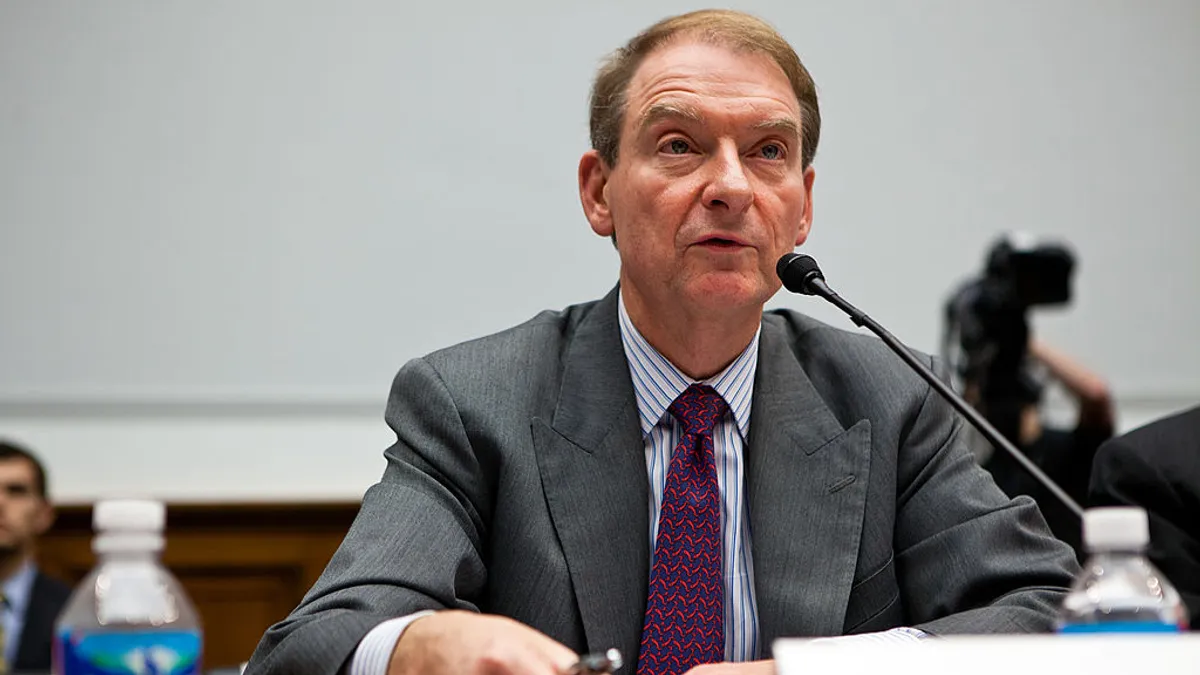Dive Brief:
- The Securities and Exchange Commission is working on an update to the rule governing the shareholder proposal process, Rule 14a-8 of the Securities and Exchange Act of 1934, at the request of SEC Chair Paul Atkins, the agency head said last week.
- Atkins particularly focused on environmental and social proposals, suggesting that part of the modernization could come in the agency’s interpretation of what sort of proposals are excludable under its no-action process, in an Oct. 9 keynote at the 25th anniversary gala for the University of Delaware’s Weinberg Center for Corporate Governance.
- The SEC is expected to propose a rule that will amend and “modernize” Rule 14a-8 in April 2026, according to the Trump administration’s unified regulatory agenda. Last week, Atkins suggested that companies may be able to argue shareholder submissions are excludable based on the state laws in which they’re domiciled.
Dive Insight:
Atkins said one of his top priorities as SEC chair is to “make being a public company an attractive proposition for more firms,” noting that Commission data found that the number of exchange listed companies has fallen to approximately 4,700 from a high of 7,800 in 2007. He said reversing this trend requires simplifying and scaling disclosure requirements, altering the litigation landscape and de-politicizing shareholder meetings.
“Perhaps nothing has epitomized the politicization of shareholder meetings more than shareholder proposals focused on environmental and social issues,” the SEC chair said. Such proposals, though non-binding, generally receive lower support than other shareholder proposals, “reflect views from both sides of the political aisle … and frequently involve issues not material to the company’s business,” he said.
“Nonetheless, these proposals consume a significant amount of management’s time and impose costs on the company,” the SEC chair said. “However, is a company actually required to include these precatory shareholder proposals in its proxy materials? The answer to this question lies at the intersection of the Commission’s Rule 14a-8 and state corporate law.”
Atkins said he has asked the agency “to evaluate whether the Commission’s original rationale for adopting Rule 14a-8 in 1942 still applies today.” While Rule 14a-8 gives shareholders a process to submit proposals, the rule only governs “proposals that can properly be brought before a shareholder meeting under state law,” he said.
If a state a company is domiciled in has its own shareholder proposal regulations, Atkins suggested the company may be able to argue in its no-action request that the proposal is excludable under that state's law.
For example, Atkins pointed to a recent paper by Kyle Pinder, a lawyer at Delaware firm Morris, Nichols, Arsht & Tunnell LLP, that argued that Delaware’s state laws do not give shareholders the inherent right to bring non-binding proposals. As of 2024, 80% of public U.S. companies are incorporated in Delaware, including 67% of S&P 500 companies, according to law firm Skadden, Arps, Slate, Meagher & Flom LLP and Affiliates.
Atkins also pointed to a recently enacted Texas state law, Senate Bill 1057, that would increase the ownership thresholds a shareholder would need to breach to bring forward a shareholder proposal. Under the law, in effect as of Sept. 1, a company that either has its primary offices in Texas or is listed on an exchange with its primary office in Texas — like the upcoming Texas Stock Exchange — can opt-in and require shareholders to own $1 million in market value or 3% of a company’s voting shares to submit a proposal to a board.
“The Commission should re-evaluate the rule’s fundamental premise that shareholders should be able to force companies to solicit for their proposals — to the extent that a shareholder proposal is a proper subject for shareholder action under state law — at little or no expense to the shareholder,” Atkins said.
While environmental and social proposals had previously been on the rise, Atkins’ comments come following a proxy season where such submissions declined. S&P 1500 companies voted on 45% fewer environmental and social proposals in 2025, as average support declined for the fourth consecutive year to 14%, according to Ernst & Young.
The SEC is also not the only government entity considering altering the shareholder submissions process. The House Financial Services Committee held a hearing in September that also included a focus on potential ways to reform the process. Witnesses for Republicans at the hearing suggested tweaks from increasing ownership and resubmission thresholds to — like Atkins — allowing state corporate laws take precedence.











